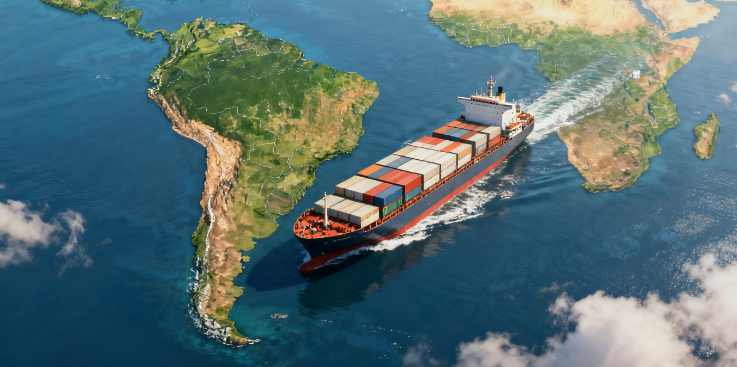
In the vast continent of South America, Brazil shines like a bright pearl, attracting global attention with its abundant natural resources, vibrant agriculture, and manufacturing industries. In this dynamic land, maritime shipping is becoming the "golden waterway" that connects Brazil with the world, carrying with it the trade, opportunities, and limitless possibilities of the future.
Brazilian Maritime Shipping: The Artery of South American Trade
As the largest economy in South America, Brazil boasts over 7,491 kilometers of coastline. Major ports such as Santos, Rio de Janeiro, and Itapoá serve as not only core hubs for domestic trade but also vital nodes in the international maritime network. These ports handle billions of tons of goods each year, ranging from soybeans, coffee, and iron ore to automobiles and electronics. Maritime shipping is undeniably the "artery" of Brazilian trade.
Why Choose Maritime Shipping? The Dual Advantages of Cost and Scale
For businesses, maritime shipping is the preferred choice for cross-border logistics due to its cost-effectiveness and immense transport capacity. Particularly for a resource-exporting country like Brazil, the advantages of maritime shipping for bulk commodity trade are pronounced:
Economic efficiency: Compared to air transport, maritime shipping costs can be reduced by 30%-50%, making it especially suitable for bulk goods and long-term projects.
Global network: Brazilian main ports are connected to over 600 ports worldwide, covering key markets in Asia, Europe, North America, and beyond.
Infrastructure upgrades: In recent years, the Brazilian government has been investing in port modernization, such as the expansion plans for Santos Port, which will further enhance throughput efficiency and competitiveness.
Challenges and Opportunities: How to Strategically Approach the Brazilian Market?
Despite the immense potential of Brazilian maritime shipping, businesses still need to address some challenges:
Complex customs clearance: Brazil's tariff policies and customs procedures are stringent, requiring preparation of compliant documentation in advance.
Infrastructure disparities: Differences in efficiency and capacity exist between ports in the north and south, necessitating the selection of optimal routes based on the type of goods.
Seasonal factors: Peak seasons for agricultural exports (such as soybean harvest) may lead to port congestion, requiring advance planning of shipping schedules.
However, behind these challenges lie opportunities. With the deepening of China-Brazil trade cooperation (with China being Brazil's largest trading partner for consecutive years) and the rise of digital logistics platforms, companies can optimize their supply chain layout through partnerships with local experts, seizing market advantages.
Future Outlook: Green Shipping and the Digital Wave
The future of Brazilian maritime shipping focuses not only on efficiency but also on sustainable development and innovation:
Green ports: Brazil is promoting emission reduction plans at ports, utilizing renewable energy sources and optimizing energy consumption.
Digital transformation: Technologies like blockchain and the Internet of Things are enhancing cargo tracking and customs transparency, reducing delays and costs.
Sail to Brazil for Mutual Success in the Blue Ocean
Maritime shipping is not just a means of transporting goods but also a bridge for commerce. Whether it's sending Brazilian coffee beans to Europe or transporting Chinese manufacturing equipment to São Paulo, this "golden waterway" is propelling the global trade wave with immense strength. For businesses, a deep understanding of the logic of Brazilian maritime shipping means opening a door to the vast market of South America.
Zhongjin International Freight specializes in South American routes, covering international full-container maritime shipping services from various marine ports in China. They provide comprehensive services for container transportation, including general containers, refrigerated containers, and open-top containers. Additionally, Zhongjin offers international ocean and air freight services to and from various global routes from Chinese ports, as well as railway import and export freight agency services. They maintain close cooperation with shipping companies, airlines, and China Railway to ensure stable rates and cabin availability. For further exploration of Brazilian maritime shipping solutions, feel free to consult their professional logistics team to help your business navigate the waves!
